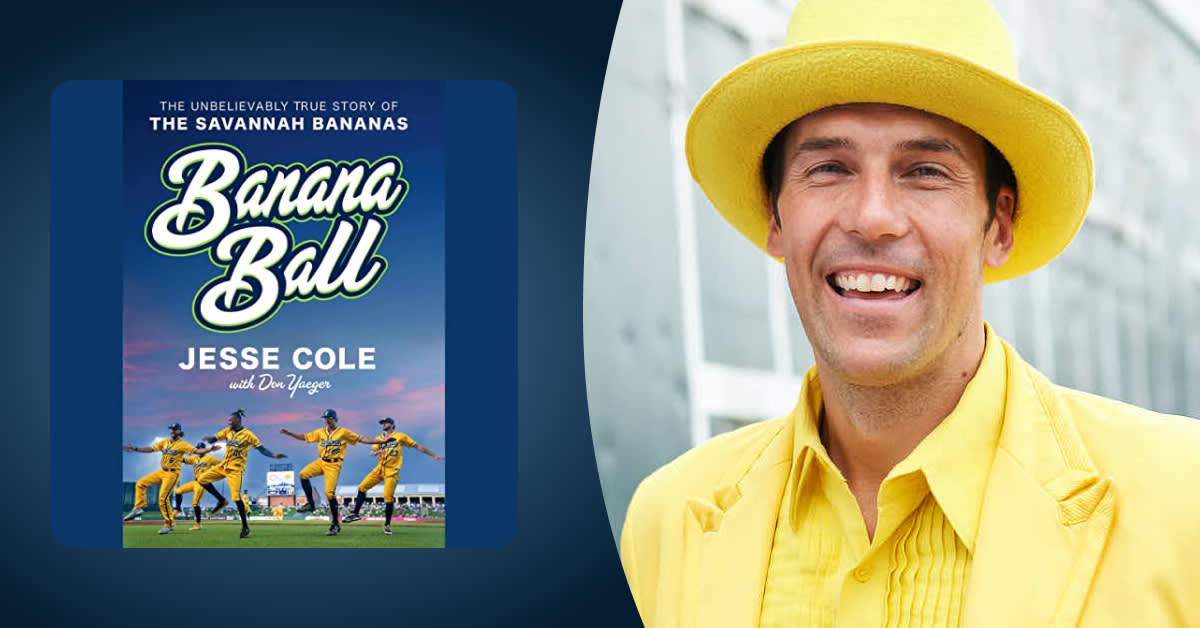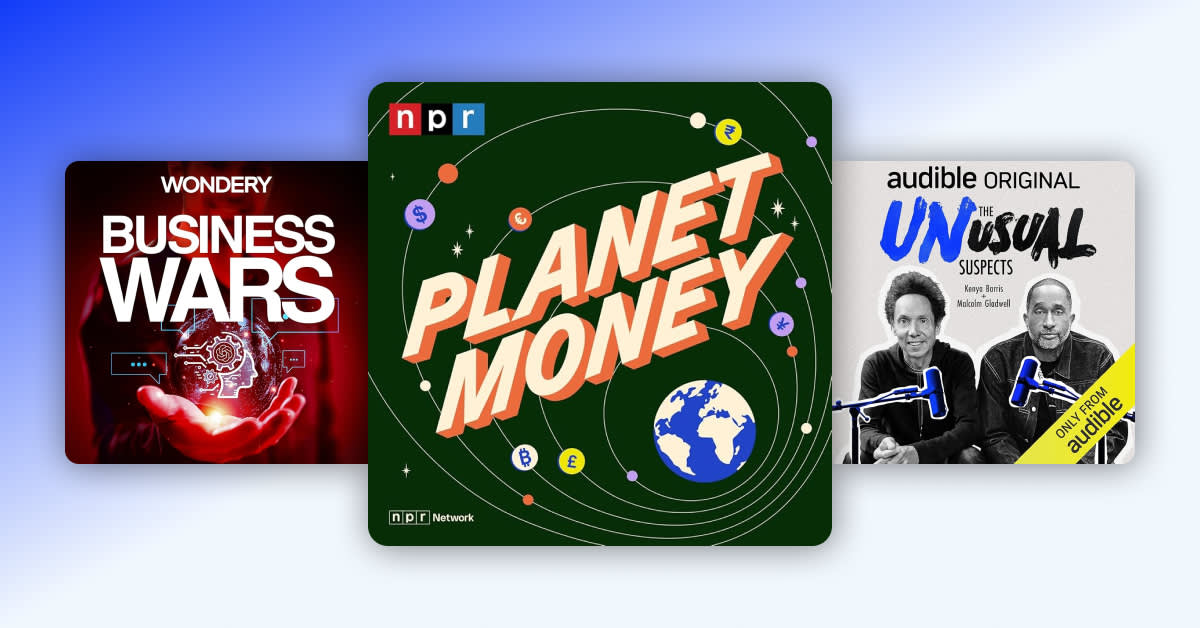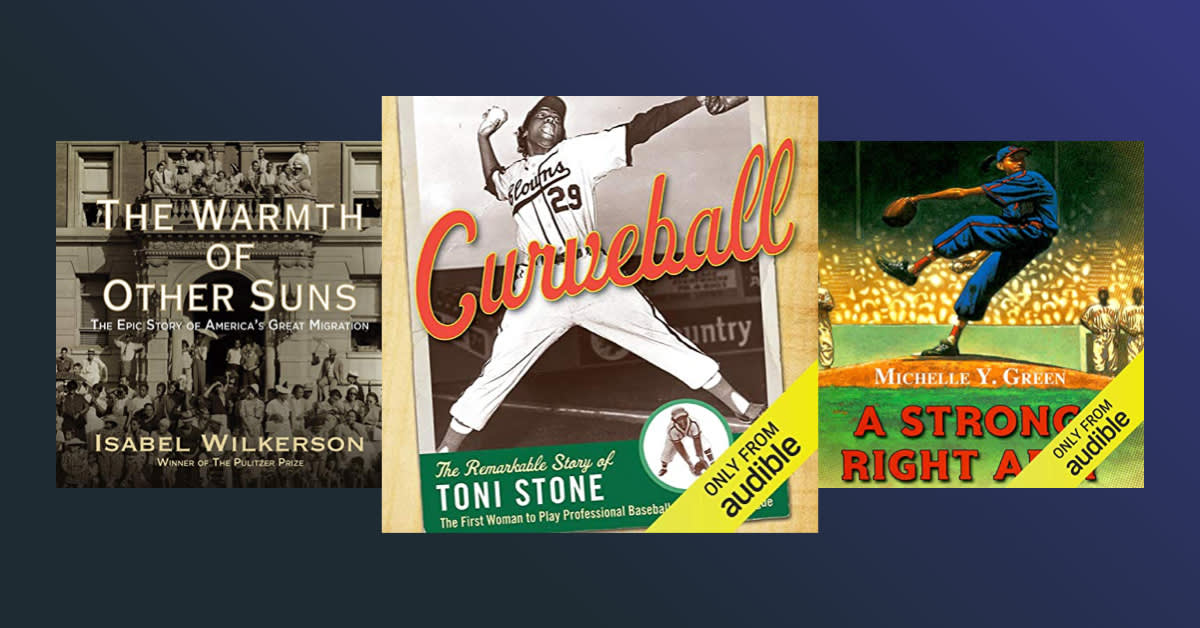If you’re a denizen of the internet, chances are you’ve come across the truly delightful Savannah Bananas. Clad in their bright yellow uniforms and equipped with charisma, charm, and seriously enviable dance moves, the team has captured the hearts of more than six million TikTok followers with their participation in viral trends and quirky on-field antics.
Their enthusiasm is undeniably contagious—every game of Banana Ball feels like a celebration, embracing joy at every turn and unafraid to get a bit silly. And that’s far from an accident. In his new memoir Banana Ball, written with Don Yaeger, franchise owner Jesse Cole gets real about prioritizing belonging, fun, and community, and in the process, forever changing the game.
Audible: What ultimately inspired the creation of Banana Ball?
Jesse Cole: Well, for me it was putting myself in the fans’ shoes. As a guy who loved playing baseball. I realized watching the game wasn't as fun, and that there were so many boring parts of the game—you know, batter stepping out of the batter's box, the mound visits, and just the pace of play wasn't exciting for me. So, I said, “What if for all the boring parts of baseball, we did the exact opposite?” We eliminated stepping out, eliminated mound visits, eliminated bunts, eliminated walks, and just added this excitement and entertainment and pace of the game that would keep fans engaged. That was one of the number one goals, literally looking and figuring out what aspects of the game weren't for the fans, that would make them want to look at their phone or go get food or talk to their friends, and thus, not want to watch the game. Let's change it and make it more entertaining!
At its heart, your book Banana Ball is built on love, whether it's familial, romantic, or fandom. Can you expand a bit on these relationships?
I was an only child. My parents got divorced when I was a kid, and my dad raised me. I was obsessed with the idea of gaining love from my dad and trying to make him proud. I think, ultimately, this is about bringing people together. I'm obsessed with the idea of bringing people together now with the Bananas and feeling that love together, no matter your demographic, no matter your age, no matter where you came from. Whether you're two years old or 80 years old, you can come to a Bananas game and have fun, and feel the love and the joy and the happiness that everyone's trying to bring. Every night, we finish with our arms around each other singing “Stand by Me”—the players, the cast, the fans. I think that showcases that goal of bringing people together as a family ... And that truly means a lot to me.
The Savannah Bananas have gained a massive following on TikTok, where participation in viral trends and the team’s unique antics alike have delighted thousands. What’s the creative process behind planning in-game entertainment? Do the players ever pitch (no pun intended) their own ideas, and are dance lessons incorporated into team practices?
Yes, we really put a ton of time and intentionality into our planning of our ideas. And yes, every week we have team meetings where we get together and talk about the over-the-top ideas, whether that's scoring celebrations, whether it's hitting entrances, anything that's going to be something different on the field. That’s what we put a lot of time into. Every week, the players get together and come up with new scoring celebrations. But the key is the rehearsals. Every single game, we spend two hours rehearsing, practicing the walk up, filming it, capturing the lip synching (“Are they nailing it?”), and making sure everything is ready to perform for the live crowd and the digital crowd.
On the topic of imagination and innovation, you’ve worked to craft an experience with universal appeal, one that’s equal parts live sporting event and full-on spectacle. Are there any creator innovators, from the world of athletics or beyond, who inspired this approach?
For me, yes. Walt Disney, number one. P.T. Barnum. Lorne Michaels from SNL. WWE and Vince McMahon. I think the reality is they all had different ideas on how to be creative and think outside the box and disrupt. I mean, the Grateful Dead—I've learned a tremendous amount from how they were all about the fans, how they literally did a different show every single night, and how they let their fans record the shows. They invested in the sound, and they invested in giving back for the fans. WWE, the spectacle of it all, bringing in celebrities and giving over-the-top entrances and making it larger than life. SNL, a new show every single week with new ideas and a new cast. I mean, unbelievable inspiration, and more from outside of sports than inside.
Shifting a bit to traditional baseball, this season a set of new rules and regulations—including the introduction of a pitch clock and defensive shift limits—have debuted in the Major League with the intent of quickening the pace of play and making for a more exciting game. What’s your perspective on these changes, and do you think they’ll make the mainstream sport more accessible or engaging for fans?
I applaud MLB. Anything they can do to make the game faster and more entertaining for fans is a win. The pitch clock obviously has taken off about 20 to 30 minutes from the game, which is huge and making a big impact. The shifts, I could go either way on it. I think they're fun. We’re doing different shifts now than we've ever done in Banana Ball. But I think they need to continue to look at and think about how they are going to encourage celebrating, how they are going to break down the barriers between the fans and the players, and not keep doing things that were traditional. Let the players have fun, and let the fans be part of it. Let them interact more. I think there’s going to be a big opportunity for MLB to create more fans in the future.
Are you a fan of audiobooks or podcasts? If so, are there any you’d recommend to listeners on baseball, creativity, business, or anything in between?
I listen to podcasts every day. I love listening—Founders, Acquired, Business Wars. Anything that really goes deep on how a company started, how they're built, the ideas, the innovation. And I go deep on some of the biggest innovators, like [Jeff] Bezos and Steve Jobs, and try to learn what they were doing differently.




